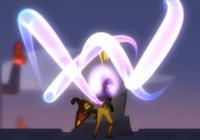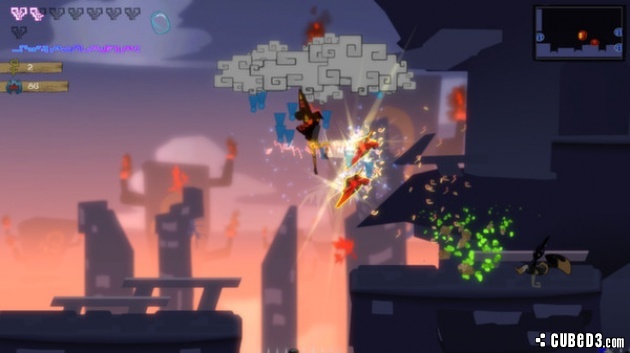Ascendant (PC) Review
By Thom Compton  19.07.2015
19.07.2015

Hapa Games adds itself into a long running list of indie studios trying out the "die once, start over" mechanic that has littered the indie scene as of late. While procedurally generated, perma-death, rogue-like games have flooded the market for the last few years, Hapa allows Ascendant a leg up by also incorporating brawler mechanics into the mix. It does little to make a difference, though. It's time to take a look at the newest example of an indie rogue-like, in the form of Ascendant.
Ascendant starts off rather rough. The tutorial stage is very sloppy, and, although it introduces the mechanics in a very thorough way, still remains confusing. There are a lot of mechanics, and they're all mapped to the left region of the keyboard. This means controls get rather confusing unless they are still fresh in the mind. While a game is entitled to having deep and complicated controls, it helps tremendously if they work correctly.
Combat is handled through a mouse click, which is somewhat awkward, but forgivable. However, it doesn't always work. A highly frequent activity in the game, combat is severely hurt by the times it has to be struck for it to work. On one count, it took five button presses to get the attack function to actually register. The other functions, like parry and magic work almost every time, but come with their own problems.

Parrying, which is heavily used, requires - unusually, even for parrying in a game - tight timing, and can occasionally be fun. However, in the middle of a large crowd of baddies, it's more than annoying trying to parry a lone enemy quickly when the timing is so strict that it's more about luck or skill. The magic suffers from the issue of being aimed, very slowly, at enemies. Aiming with the mouse is nothing short of obnoxious.
Combat in Ascendant is also weighed down by the fact that enemies are hard in all the wrong ways. While there's nothing wrong with the enemies having the upper hand, many of them require quick and accurate decisions in order for that advantage to switch parties. Slow methods of combating enemies might be remedied by a controller, but it can't be assumed all players have one.
The AI is also very dim. Enemies will often stand there if the player is not moving. They often move away in a desperate attempt to remove themselves from any kind of altercation. They also don't seem to have any sort of health gauge. Some of them die after a few whacks, while others can be juggled seemingly indefinitely, and keep coming back for more.

A brief aside, procedural generation is fine, if - and only if - it adds to the gameplay. Many games today use it, and Ascendant is no exception. Unfortunately, it's hard to really notice any difference other than how platforms and enemies are placed. Procedural generation allows each playthrough to be different, but each playthrough of Ascendant is so similar, it's hard to notice or care.
This could all be forgiven, if the art or sound were really great, or even moderately good. It's painful to say neither of these can be said. Starting with the sound, it holds a lot of potential. As the main menu loads, a mild soundtrack begins, and it sets the mood perfectly. Somber, yet with an ominous tone, it's clear a journey wrought with trials to overcome waits. The problem is the soundtrack rarely changes, mostly just repeating itself over and over.

The art work, again, starts off fairly promising. The main menu screen has a certain mysticism to it, and the character select screen shows the brilliantly realised character models. Disappointingly, as the game proceeds, the art work seems very sloppy. The enemies appear to be hastily drawn up, and environments are painfully dull and largely repetitive. The whimsical feel the game seems to be going for leads to it looking flat, like a quickly forgotten children's novel.
When playing a game, it's a goal to find the most appropriate cons and pros to list, and finding a nice juxtaposition between the good and the bad is very important. While this procedurally generated rogue-like beat 'em up aims to be a very unique experience, it constantly falters in every way possible. It has novel ideas, but it never sees them blossom into anything other than hardly recognisable good ideas lost to poor execution. It would be easy to pass over this game, and it's hard to deter such an action. Unfortunately, Hapa Studios' first title, Ascendant, leaves a bad taste behind that just won't rinse out as long as the game is running.

Cubed3 Rating
Bad
Ascendant makes odd choices early on, but it's hardly fair to judge a game simply by the choices it makes. It's more important to point out the execution, which falters heavily. Even the best choices the game makes frequently end up being downsides to the game. Not once can it be found: a moment of genuinely enjoyable gameplay without it being mixed with poor execution. Hopefully, Hapa Studios can take the broken pieces and build something worth enjoying someday. Today, though, Ascendant isn't it.

![]() 3/10
3/10
![]() 0
(0 Votes)
0
(0 Votes)
 Out now
Out now  Out now
Out now  None
None  Out now
Out now Comments
Comments are currently disabled

 Sign In
Sign In Game Details
Game Details Subscribe to this topic
Subscribe to this topic Features
Features







 Top
Top

